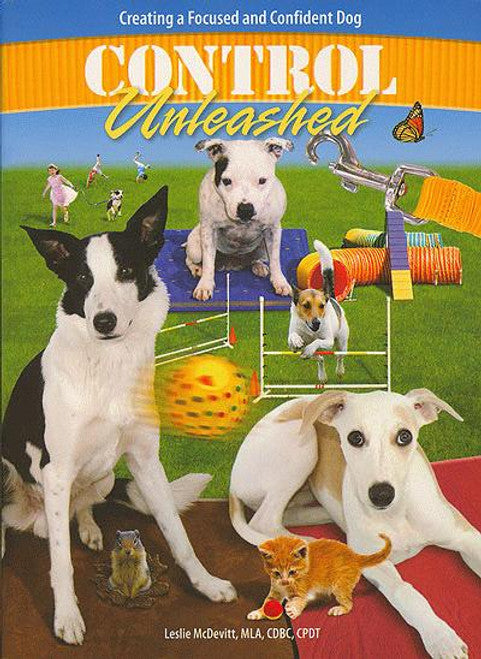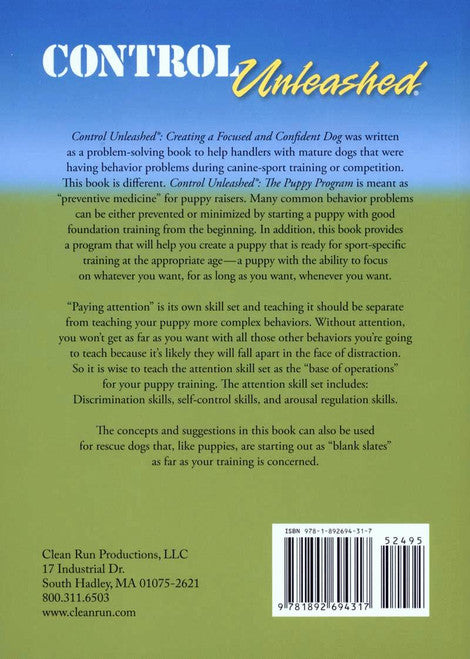Control Unleashed: Creating a Focused and Confident Dog by Leslie McDevitt
$ 24.95
Please select all options.
Winner of the IIACAB Award for 2007, Best Dog Training Book
Learn how to turn stress to confidence and distraction to focus using methods that are 110% positive. Leslie McDevitt's versatile Control Unleashed program is designed to help "dogs with issues" learn how to relax, focus, and work off-leash reliably in either stimulating or stressful situations. Whether you're training a challenging dog on your own, an instructor trying to figure out how to help dogs in your classes, or an instructor who wants to design a special program just for stressed out dogs, this book is for you. Who needs Control Unleashed? Dogs that are uncomfortable or unable to work off lead around other dogs Dog that are easily distracted and have difficulty concentrating Dogs that are reactive or easily aroused Dogs that are anxious or stressed and shut down Dog that are unable to control their impulses when excited This training program can change your dog's life!
What reviewers are saying...
APDT CHRONICLE OF THE DOG
One of the most common challenges faced by dog trainers is how to effectively manage problem dogs in their classes. Many of us inwardly cringe on that first night of class when a reactive dog comes through the door barking, lunging and displaying other behavior indicative of a dog that is out of control. Dog owners look to us to keep them safe, ensure an environment conducive to learning and use our special knowledge and skills to handle the out of control dog that threatens to disrupt class. Thankfully there is a book that walks both instructors and dog owners through creative, positive, science-based methods for transforming dogs in an anxious, excitable state into one that is calm and in which they are able to focus and learn. It is easy to read and understand and nicely formatted to make the many approaches she suggests palatable. Though the book was targeted to agility instructors, McDevitt offers practical, useable advice for all instructors and the handlers of reactive dogs. A major goal of Control Unleashed (CU) is to create awareness of complex responses to stimulation and help each handler think through how she can adjust her dog to different situation and thereby honor each dog.
She uses many of the principles professional dog trainers are all familiar with in CU: Learning to read your dog s signs of stress; Conditioning a relaxation response so the dog can think; Working with dogs prior to reaching a threshold of arousal; Finding the point at which each dog can work and learn; Reframing the picture so the dog sees what has been anxiety provoking as safe; and Using the Premack Principle to create attention and focus on the owner. However, what makes her approach unique and valuable to me is that she prescribes a novel combination of ways to do this and one that can be adapted to individuals. I especially like her methods of reducing anxiety and conditioning a relaxed response in a dog, thereby changing their internal state and response to stimulus. These include bodywork (TTouch and massage) and employing Dr. Karen Overall s conditioned relaxation protocol.
In addition, McDevitt uses the Premack Principle with a twist, and resolves a conflict that has long troubled me about dog training; the expectation that the handler must train the dog to ignore the environment and offer constant attention. Underlying this expectation is the notion that the owner must be more interesting than anything else in the dog s environment. Thus, if the dog fails, she fails. I have long wondered if this is necessary or even desirable but dared not question such a bedrock principle in training, especially without being able to propose an alternative. McDevitt alleviates the conflict and pressure implicit in this with her Look at that game.
She rewards the dog for doing what it wanted to do in the first place, e.g., watch the environment, in exchange for attention. In doing so she uses reverse psychology to create a dog that offers the handler the attention they desire and produces a win-win outcome for both. The book is laced with examples of her techniques in practice for both her own dog and others who try her approach. Her approach is so common sense, I often caught myself wondering, Why didn't I think of that? But as Benjamin Franklin said, Common sense is not that common. There lays the beauty of Control Unleashed, a book whose simple wisdom I will be striving to employ in my training for quite sometime. Mary Zoller



